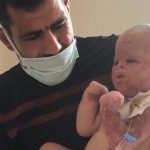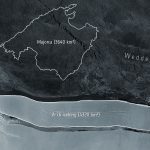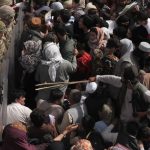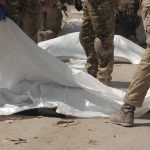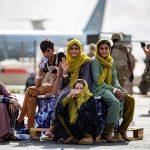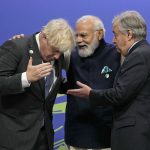Has World War Three already started?
Some security experts believe so, others say it is only a matter of time until Russia’s invasion ignites the spark that triggers an existential global conflict.
There is still a reality where such a disaster is avoided – or at least delayed.
Please use Chrome browser for a more accessible video player
But right now, with violence raging across Ukraine and hostilities ramping up between Moscow and Western allies, the risk of events blowing up into World War Three has never been greater.
And, given the advance in weapons – including nuclear warheads – since 1945, the potential consequences for the entire planet could not be graver.
It is worth considering how events could unfold and why it is dangerous to assume the tragedy and suffering unleashed upon Ukraine will be contained within its borders.
Ukraine invasion: Russia is a cyber power – does that mean a cyber war is coming?
Ukraine invasion: Life underground as people take refuge in basements, shelters and metro stations
Ukraine invasion: Supermarket shelves empty in Lviv and Kyiv as fighting enters the seventh day
First of all – as Jens Stoltenberg, the secretary general of the NATO alliance observed this week – war is dangerous. It is also unpredictable.
Follow the Daily podcast on Apple Podcasts, Google Podcasts, Spotify, Spreaker
Most crucially, the war in Ukraine has become a proxy battlefield in a much wider contest between Western, liberal democracies and the world’s authoritarian regimes.
Vladimir Putin’s decision to invade Ukraine is centred around a desire to reverse an expansion eastward of the NATO alliance since the end of the Cold War and to reset the balance of security and influence in the region more favourably in his direction.
It means the outcome of his actions could shape the fate of the whole of Europe.
The stakes could not be higher.
Most immediately, Russia’s invasion is a disaster for an entire generation of Ukrainians, fighting for their survival or forced to flee.
But the shockwaves of the attack have also had a profound effect on the international system, with economic, financial, trade, cultural, travel, news and sporting ties between Russia and the West all but severed.
Please use Chrome browser for a more accessible video player
President Putin on Saturday described a decision by the West to impose unprecedented sanctions against his regime as “akin to declaring war”.
World War Three has already begun, just not on the battlefield
He is right. The two sides are locked in an economic and political war.
But the UK, US and other allies were only responding in the harshest way possible short of military confrontation to the Russian leader’s aggression in Ukraine.
The key question is whether the two sides have the restraint and/or desire to keep this wider conflict beneath the threshold of a full-blown military one.
It is a delicately-balanced equation and underlines the fragility and the greyness of the line between what is conventionally viewed as peace and war.
How war between Russia and the West could break out
In terms of potential flashpoints that tip the world into armed confrontation, there are many.
For example, NATO allies have made it very clear that they will not send troops into Ukraine to help the Ukrainian armed forces defend themselves.
Such a move would effectively be a declaration of war with Russia from the moment the two sides start killing each other in direct combat.
The same argument has been used by the West to reject increasingly anguished pleas by President Volodymyr Zelenskyy and his government to impose a no-fly zone over Ukraine’s skies.
NATO has said that such a move – which would doubtless reduce Russia’s ability to launch airstrikes against towns and cities, saving civilian lives – would involve Western warplanes going into combat with Russian jets, a move that could also trigger a much wider war.
Every burning tank helps morale
Instead, individual allies, including the UK, the US and even – since Russia’s invasion began – previously more pacifist Germany, are attempting to track a middle line between direct intervention and doing nothing.
Please use Chrome browser for a more accessible video player
This involves sending in weapons and ammunition to bolster Ukraine’s ability to defend itself.
“Every burning tank is what keeps us going,” one Western official said.
The contributions include surface-to-air missiles and is set to include warplanes.
The end result is not as effective as NATO directly protecting Ukraine’s airspace but it is clearly helping Ukraine do what amounts to the same thing.
Russia will appreciate the distinction, is the hope.
But that, too, is a matter of choice and with that comes risk.
What if Moscow decides to view the downing of one of its aircraft by a missile gifted to the Ukrainians by America as akin to the US shooting it down directly?
The outcome – all-out war between Russia and the West – would be the same.
But the alternative for Western allies of doing nothing to support Ukraine militarily would simply make Ukraine’s defeat inevitable, enabling Russia to score the prize of locking its neighbour into facing east, rather than west.
That would be a devastating blow for Ukraine.
Russian victory could fuel further takeovers
It would also have a profound impact on the balance of power in Europe and it could ultimately fuel the appetite of other authoritarian regimes – principally China – to use military force to impose their will over other nations.
A chilling but very real prospect.
Another factor that could make Russia’s invasion of Ukraine explode into a wider war is by accident.
The longer the conflict goes on, the greater risk of a stray Russian missile or rocket hitting one of the NATO countries that boarder Ukraine, or taking out an allied warship or jet operating close by.
Allies have bolstered their defences along their eastern flank in response to Russia’s actions in Ukraine, meaning that there is just a lot more military hardware and personnel in the region, raising the risk of a mistake.
There are channels of communication between the two sides to deconflict military movements and to defuse the crisis should something unintentional take place.
But it is not guaranteed.
Finally – and this is not an exhaustive list – there is the possibility of a miscalculation by Russia setting off a chain of events that erupts into global war.
That may well have already happened with Putin’s decision to invade Ukraine.
But what if he decides to move further, such as to target next door Moldova, or directly test NATO unity by attacking a member of the alliance directly?
The ability of the world to absorb such shocks without security breaking down is finite and it is already being tested to the limit.


